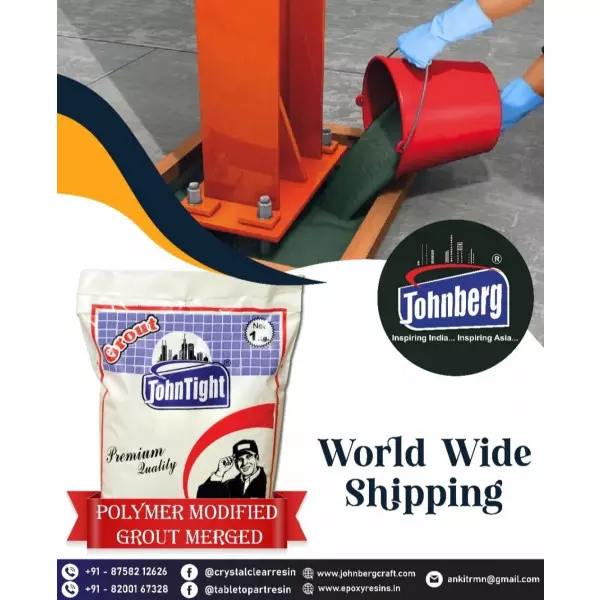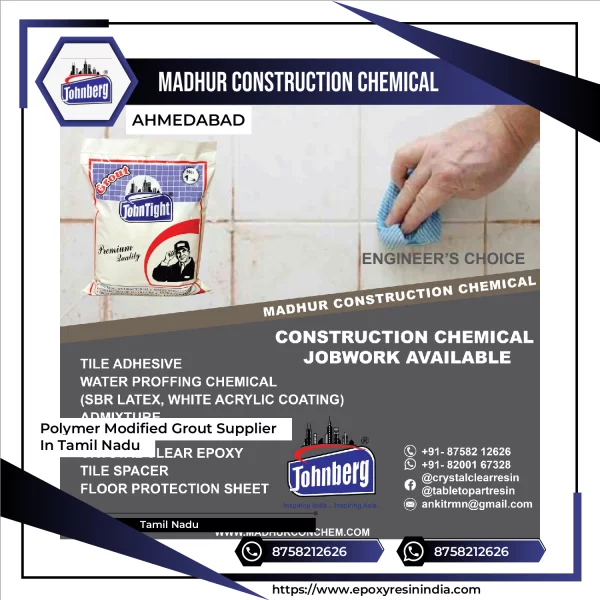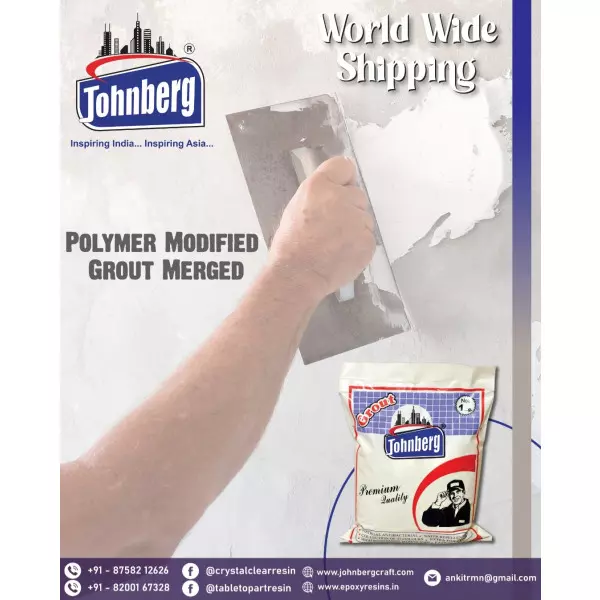- Home
- About Us
- Products
- Resin Furniture
- 3D Epoxy Flooring Service
- Resin Table Top
- Wooden Epoxy Resin Table Top
- Metallic Epoxy Flooring Service
- Conception Chemical Consultants
- Chemical Consultancy For Construction
- Construction Chemical Consultant
- Tile Grout
- Foundation Grout Consultant
- Paver Block Chemical Consultant
- Waterproofing Chemical Consultant
- Epoxy Pigment Consultant
- Heat Reflective Coating
- Water Repellent Coating
- Epoxy Grout
- Chemical Consultant
- Industrial Chemical
- Construction Chemical
- Epoxy Resin
- Epoxy Coating
- Polyester Resin
- Joint Sealants
- Cristal Clear Epoxy Resin And Hardner
- Construction Chemicals
- Polycarboxylate Ether And Liquid
- Solvent Cement
- Tile Protection Sheet
- Water Reducing Superplasticizer
- Epoxy Resin And Hardeners
- Two Component Waterproof Coating
- Epoxy Floor Coatings
- Casting Resin
- Sbr Latex Polymer
- Epoxy Grout Formulations
- Epoxy Resin Tabletops
- Tile Spacers
- Tile Levelling Spacers
- Industrial Night Vision Epoxy Grout
- Sbr Latex
- Johnberg Marble Polishing Liquid
- Acrylic Elastomeric Coating
- Weber Tile Adhesives
- Decorative Arts
- Resinic Crafts
- PU Flexible Tile Adhesive
- Resin Pressed Flowers
- Dry Pressed Flower
- Epoxy Putty
- Resin Furniture
- Services
- Updates
- Gallery
- Contact Us
Polymer Modified Grout Manufacturers In Bhopal
Details of Polymer Modified Grout
Polymer modified grout is a type of cement-based grout that has been enhanced by the addition of polymer materials. These polymers improve the physical and chemical properties of the grout, making it more durable and versatile than traditional grout.
Components:
Cement – Acts as the primary binding material
Aggregates – Fine particles such as sand to provide body and strength
Polymers – Usually latex or acrylic-based additives in liquid or powder form
Water – Used to mix the dry ingredients into a workable paste
Properties:
Improved Bond Strength – Better adhesion to tile and substrate
Increased Flexibility – Can tolerate slight movement or expansion without cracking
Enhanced Water Resistance – Suitable for wet areas such as bathrooms and kitchens
Reduced Shrinkage – Less likely to crack or pull away from edges
Higher Durability – Withstands wear and tear over time
Applications:
Tiling Projects – Used to fill joints between tiles in walls and floors
Wet Areas – Ideal for showers, swimming pools, and exterior applications
High Traffic Areas – Performs well in commercial and industrial settings
Advantages:
Easy to apply and clean
Compatible with a wide range of tiles
Maintains color better than standard grout
Suitable for both interior and exterior use
Curing and Maintenance:
Curing typically takes about 24 to 72 hours depending on the product and environmental conditions
Regular cleaning helps maintain appearance and performance
Sealing may be recommended depending on tile type and usage area
Offered Product
Polymer Modified Grout
BrandJohnbergUsage/ApplicationConstructionJoint Width5mmPackaging Size5 KgShelf Life24 MonthsDensity1.2Temperature120 Degree CelsiusMaterialCementPackaging TypePP Bagohnberg Brand Epoxy Grout For Tiles Grouting Application. High Strenght, Stain Proof, Easy To Use And Easy Ro Clean Application.... Read morePolymer Modified Grout Supplier In Tamil Nadu
Polymer Modified Grout Is A Type Of Grout That Has Polymers Added To Improve Its Performance. The Addition Of Polymers Enhances Its Adhesion To Surfaces, Flexibility, And Resistance To Cracking. It Also Makes The Grout More Durable, Water Resistant, And Able To Withstand Chemical Or Environmental Exposure. This Type Of Grout Is Commonly Used In Areas That Require Extra Strength Or Flexibility, Such As Bathrooms, Kitchens, And Exterior Tiles. It Can Fill Gaps Between Tiles While Providing Long La Continue
Polymer Modified Grout In Agra
Polymer Modified Grout (PMG) Is A Type Of Cementitious Grout That Includes Polymer Additives To Enhance Its Performance. These Polymers—either Liquid Latex Or Redispersible Powders—are Added To Traditional Grout Mixes (usually Made Of Cement, Sand, And Water) To Improve Specific Properties Like Flexibility, Adhesion, And Water Resistance.Key Components:Cementitious Base:Portland CementFine Graded SandPolymer Additives:Liquid Latex (e.g., Styrene-butadiene Rubber Or Acryli Continue
Polymer Modified Grout Manufacturers In Nashik
Polymer Modified Grout Is A Type Of Grout That Includes Polymer Additives To Improve Its Performance. It Offers Enhanced Bonding Strength, Flexibility, And Water Resistance Compared To Traditional Cement-based Grout. This Grout Is Commonly Used For Filling Joints Between Tiles And Is Suitable For Both Interior And Exterior Applications. It Is Ideal For Areas Exposed To Moisture And Movement, Such As Bathrooms, Kitchens, And Outdoor Spaces. The Polymer Content Helps Reduce Cracking And Increases Continue




